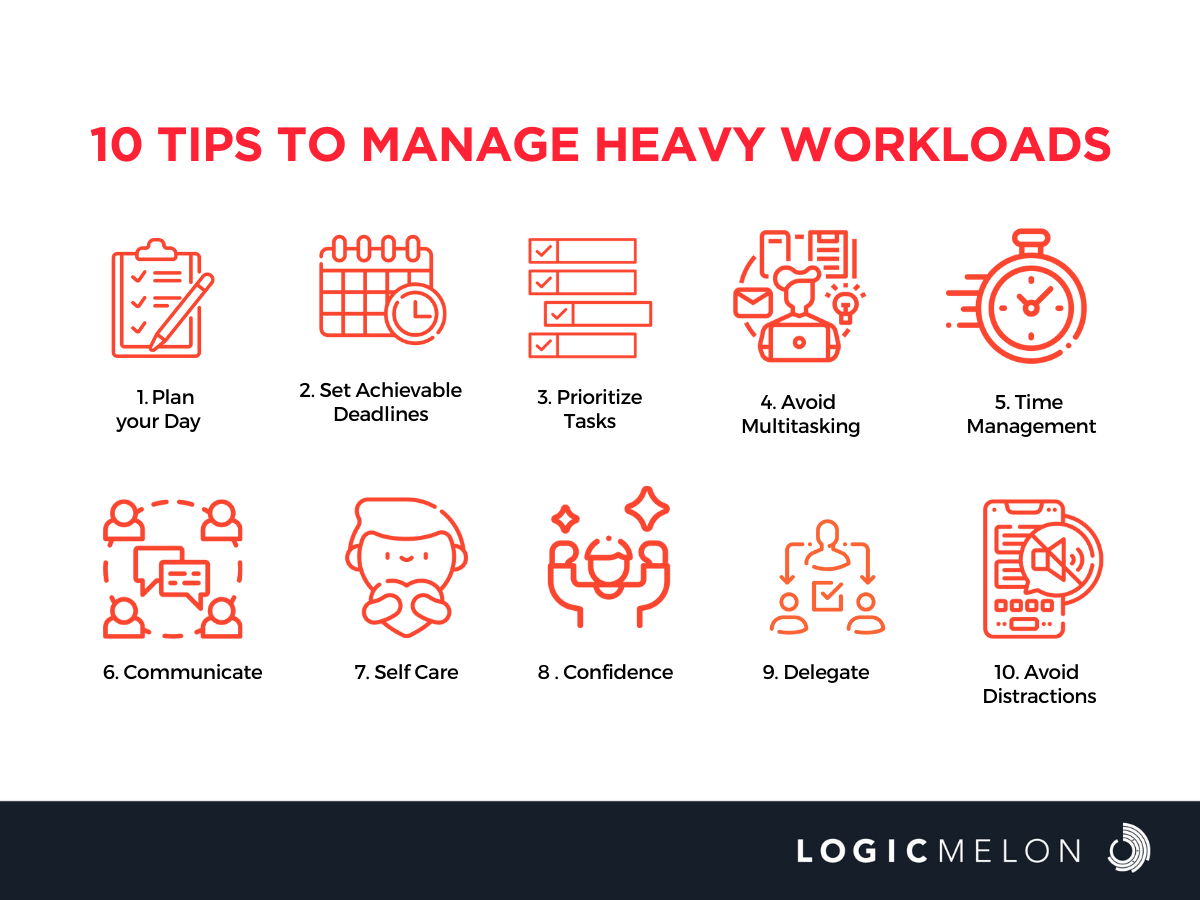Tips to Manage Workload in Your Organisation
Workload management is the process of assigning work to a team in a way that distributes the workload optimally with available resources.
Every employee need to understand how to manage workload to handle their tasks efficiently in an organisation.
An increased workload can lead to higher stress levels, which can result in burning out. Managing workload is done to strategically distribute work throughout the workforce to maximize employees’ skills and performances.
The Importance of Workload Management
Successful workload management is a process that is effective in the distribution of tasks. Workload management is important because it helps you to better manage your team members. This allows the allocating of work more effectively throughout the team, reducing employee stress.
Workload management helps to distribute a project workload across your team according to each person’s skill, ability, and availability. This process can help to improve the intellectual and decision-making skills of an employee while handling workloads.
The Effects of Heavy Workload
1. Relationships
A heavy workload can cause unhappiness in relationships by not allowing you to spend time with loved ones. The workload can cause disruption in relationships, since people may become too focused on work.
2. Performance
The workload can cause exhaustion, where even simple tasks can make you feel overwhelmed, which can affect your performance.
3. Risk of Health Problems
The effects of a heavy workload do not end with the employee’s physical deterioration. Team members are also prone to suffer social and mental issues in the process as well. The employees taking sick days can affect the productivity of the organization.
10 Tips to Manage Workload in Your Organisation
The following are 10 tips to help you to manage workload in your organisation:

1. Plan Your Day
Planning helps to focus on important tasks. Effectively planning the workload tasks can help to boost focus and productivity. Planned tasks are easier to finish than unplanned tasks.
Plan your day according to the time frame in which the tasks get completed. This can help you stay motivated and reach your goals.
2. Set Achievable Deadlines
Deadlines help to collaborate towards being on track to achieve a goal. Setting deadlines and sticking to them means that we can take control of work and be on track. Besides this, people must have a realistic deadline to achieve their goals.
Make sure the goals are SMART. SMART stands for specific, measurable, attainable, relevant, and timely. Specific is to have a specific need or target. Measurable meaning you can quantify it. Attainable is making sure your plan is realistic. Relevant means that the goal aligns with the organization’s objectives. Timely means your goal has a realistic deadline for completing tasks.
3. Prioritize Tasks
Prioritizing tasks includes what tasks are to be completed based on importance. This strategy may help you to organize your time more efficiently.
Set priorities to manage workloads by finishing up the tasks in an organized manner.
4. Avoid Multitasking
Multiple tasks can increase stress. Avoiding multitasking during a workload environment can help you focus on work that is important, so you can work on one project at a time.
5. Time Management
Time management is the process of planning and exercising control of time spent on specific activities to increase effectiveness, efficiency, and productivity. Time tracking helps to control time spent on specific activities.
6. Communicate
Communication is sharing and exchanging information, ideas, or feelings with other people. It helps us to build relationships by allowing us to share our experiences and needs, as well as helping us to connect with others. Effective communication during heavy workloads can help solve tasks with the help of ideas shared by other people who might have experienced it earlier.
7. Self-Care
Self-care is taking care of oneself with the behaviors to promote health and active management of illnesses when they occur. It is the practice of individuals looking after their own health, using the knowledge and information available to them.
8. Confidence
When you become confident with sustaining a heavy workload, your abilities increase, along with the quality of your work. A confident attitude toward your abilities to complete certain tasks can make the work easier than having a negative attitude.
9. Delegate
A delegate is a representative authorized to speak or act for others. A person with a heavy workload can delegate his work to act for them.
Delegation helps to focus on higher-value activities, while other work can be done by the other person.
10. Avoid Distractions
Distractions can affect the quality of work. A heavy workload affects the performance and productivity of an employee, which can result in low morale during work.
The person, while managing the workload, has to be focused and avoid distractions in the workplace because, if not, the workload cannot be effectively managed.
Frequently Asked Questions
1. How do you plan your day in managing workloads?
Plan your day according to your priorities, not necessarily that what you planned should work every time. Planning your day gives you an idea of how to manage your workload.
2. Why is managing workload important?
Workload management is important because it helps to utilize resources more efficiently across the team or organization. Managing workload can help you to organize your work and complete tasks on time without compromising standards.
3. How does workload affect the performance of a person?
Workloads that are too large can cause performance to decline. This means that workload can have an impact on employee performance. When the workload creates difficulties for employees, the employee’s performance can decline.
4. How would you use time management skills to manage your workload?
Prioritizing, delegating, decision-making, and schedules are good time management skills. These skills help you finish tasks in an efficient and effective manner.
Closing Thoughts
Managing workload is the process of doing tasks to maximize their time and energy each day efficiently and effectively. This process helps employees to reach their potential by using their skills to manage the workload. The goal has to be SMART, which is Smart, Measurable, Attainable, Realistic, and Timely. The ways to manage heavy workloads are planning your day, setting achievable deadlines, prioritizing tasks, tracking time, communicating, and delegating. The times can be challenging, while dealing with heavy workloads, stay confident, and work by prioritizing tasks based on their importance, as well as by knowing the timeframe of the task.
LogicMelon
Award-winning recruitment software that will find, attract, hire and analyse the way you want to work. At LogicMelon, we have experienced software recruitment marketing specialists to help you build effective recruitment solutions supported by the best customer service you’ll find anywhere!
Email: sales@logicmelon.com or call LogicMelon (UK) +44 (0) 203 553 3667 (USA) +1 860 269 3089
Innovative Sourcing Strategies to Attract Passive Candidates
By embracing innovative sourcing strategies and genuinely connecting with passive candidates, you’ll find hidden gems that take your organisation to new heights.
Gamification in Recruitment
Say hello to interactive quizzes, behavioural tests, and company-related challenges that make screening conversations entertaining.
Stepping Out Of Your Marketing Comfort Zone
The comfort zone is defined as a ‘situation in which you feel comfortable and in which your ability and determination are not being tested’ and that, as any marketing professional knows, is not a place where we want to be.


